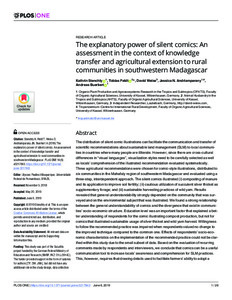| dc.date.accessioned | 2019-09-10T15:18:03Z | |
| dc.date.available | 2019-09-10T15:18:03Z | |
| dc.date.issued | 2019-06-06 | |
| dc.identifier | doi:10.17170/kobra-20190909664 | |
| dc.identifier.uri | http://hdl.handle.net/123456789/11314 | |
| dc.description.sponsorship | Gefördert durch den Publikationsfonds der Universität Kassel | ger |
| dc.language.iso | eng | eng |
| dc.rights | Urheberrechtlich geschützt | |
| dc.rights.uri | https://rightsstatements.org/page/InC/1.0/ | |
| dc.subject.ddc | 630 | |
| dc.title | The explanatory power of silent comics: An assessment in the context of knowledge transfer and agricultural extension to rural communities in southwestern Madagascar | eng |
| dc.type | Aufsatz | |
| dcterms.abstract | The distribution of silent comic illustrations can facilitate the communication and transfer of scientific recommendations about sustainable land management (SLM) to local communities in countries where many people are illiterate. However, since there are cross-cultural differences in “visual languages”, visualization styles need to be carefully selected as well as locals’ comprehension of the illustrated recommendation evaluated systematically. Three agricultural recommendations were chosen for comic-style illustrations, distributed to six communities in the Mahafaly region of southwestern Madagascar and evaluated using a three-step, interdependent approach. The silent comics illustrated (i) composting of manure and its application to improve soil fertility; (ii) cautious utilization of succulent silver thicket as supplementary forage; and (iii) sustainable harvesting practices of wild yam. Results revealed that general understandability strongly depended on the community that was surveyed and on the environmental subject that was illustrated. We found a strong relationship between the general understandability of comics and the divergence that exist in communities’ socio-economic structure. Education level was an important factor that explained a better understanding of respondents for the comic illustrating compost production, but not for comics that illustrated sustainable usage of silver thicket and wild yam harvest. Willingness to follow the recommended practice was impaired when respondents valued no change to the improved technique compared to the common one. Effects of respondents’ socio-economic characteristics on the implementation of the recommended practice could not be clarified within this study due to the small subset of data. Based on the evaluation of recurring comments made by respondents and interviewers, we conclude that comics can be a useful communication tool to increase locals’ awareness and comprehension for SLM practices. This, however, requires that drawing details used to facilitate farmers’ ability to adopt a point-of-view inside the comic story are used thoughtfully as they might interfere with the central message. | eng |
| dcterms.accessRights | open access | ger |
| dcterms.creator | Stenchly, Kathrin | |
| dcterms.creator | Feldt, Tobias | |
| dcterms.creator | Weiss, David | |
| dcterms.creator | Andriamparany, Jessica N. | |
| dcterms.creator | Buerkert, Andreas | |
| dc.relation.doi | doi:10.1371/journal.pone.0217843 | |
| dc.type.version | publishedVersion | |
| dcterms.source.identifier | ISSN 1932-6203 | |
| dcterms.source.issue | 6 | |
| dcterms.source.journal | PLoS ONE | eng |
| dcterms.source.pageinfo | e0217843 | |
| dcterms.source.volume | Volume 14 | |

